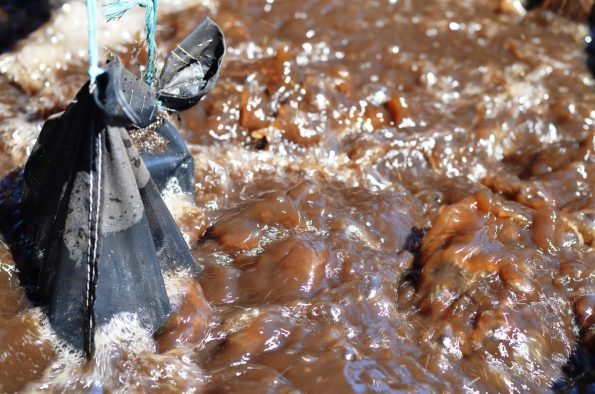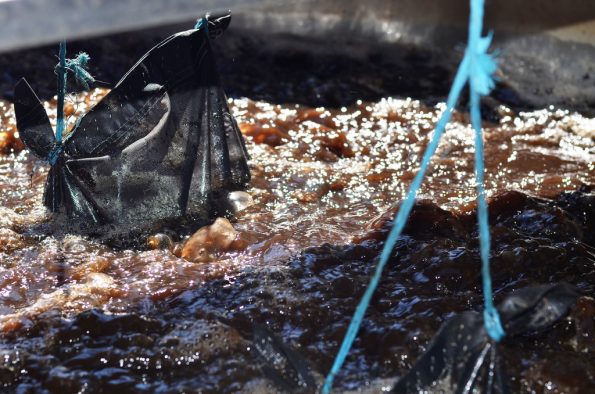Compost Tea

I guarantee your reaction to drinking compost tea would not be the same as above. Love me some tea, but compost tea is a plants only beverage. You’ll see why in a few minutes.
First let’s talk about what it is exactly. Most gardeners are familiar with what compost is. I wrote an in-depth article about it if you want to read up on the many different compost methods.
Compost tea is basically a liquified version of compost. In it’s simplest form, it is just compost and water mixed together well and added to your plants. But to really gain the most from it, it needs to be brewed.
Types of Compost Tea

As mentioned above, there is a simple way to make it by simply mixing compost with water. This method is easy, quick and can be added straight to plants. But it doesn’t maximize the value of the tea. That’s because you’re not increasing the beneficial microbes.
Brewing compost tea is what brings out those microbes, which can really add to your soil and do great things for your plants. There are a few methods to this, but the main factor in this is adding air to the mixture. This is done via an aerator.
The purpose of adding air is to create a highly oxygenated environment which encourages aerobic growth of the beneficial bacteria. It’s not a super quick method, usually taking between 24-72 hours. But it’s worth it.
Making Your Own Brew

The basic necessities for brewing compost tea is a 5 gallon bucket, a permeable bag to steep the compost in (optional), and an aerator. These items are cheap and if you don’t have your own compost you can pick up a bag at your local garden center. You don’t need very much.
Other ingredients include molasses (no preservatives), 5-1-1 fish fertilizer, and liquid seaweed fertilizer. You only need a couple handfuls of compost, 2-3 tablespoons of molasses and one-ish tablespoon of either fertilizers. The sugar from the molasses feeds the bacteria causing them to multiply like crazy under the aerobic conditions.
Make sure you are using a clean bucket and air tubes. Plug in your aerator to a GFI protected outlet and run the cord where it can’t get wet. Fill the bucket to about 5″ below the top with water. Set the aerator in and turn on, then add and mix the ingredients together. Leave this to brew for 24-72 hours.
IMPORTANT: You must use non-chlorinated water… this includes tap water. Chlorine will kill off the beneficial microbes you’re trying to support. If you have to, just buy water. You can try to out-gas the the chlorine by running the aerator in the water for about 1/2 hour before adding the ingredients. However, this doesn’t elimiate all types of chlorine. Ideally, rainwater would be best.
Pre-made brews such as Boogie Brew are out of the box solutions for compost tea. They do tend to be a bit pricy, but gardeners who use them say it definitely makes a difference.
The great thing about them is that they are usually well tested recipes. That means they’re great to use without any additions straight from the box.
Some people add other things such as more compost or rock dust but this isn’t necessary. The brewing process itself is the same as described above.
One drawback to these is that they don’t have a long shelf life. This is mainly because the product inside is alive, just like how any great soil is alive. So if you’re going to buy any, try to make sure it’s fresh.
When The Brew Is Ready
The final product of compost tea will be very foamy. This is due to the rapid population growth of the micro organisms. Now you are ready to feed your plants and soil.
You can also put your compost tea in a spray bottle and apply it to the leaves. Plants can absorb nutrients through their leaves and the solution can also act as a protective barrier.
One last thing to keep in mind, diluting your tea before applying may be a good idea. Although not completely necessary, it can be pretty strong and your plants/soil might not be prepared for it. Plus, diluting it a little can make it go farther.
Video Explanation
I hope you enjoyed this article! If you liked it and learned something please don’t hesitate to share. Got any tips for compost tea? Drop them in the comments below. I would love to hear them.
